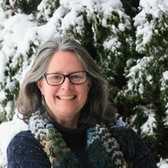

Pre-service Teachers, Other Educators
STEAM Teacher Coordinator
Dr. Laurence was a NITARP educator in 2013.
Dr. Wendi Laurence was elected to serve a three-year term on the National Science Teachers Association Council as District XIV Director (representing AZ, CO, UT). She will take office on June 1, 2018.
Dr. Laurence writes that she will be on the 2018 Teacher Advisory Board for Inifiniscope.
Dr. Laurence appears in a nice article about integrating science and the theater: STEAM!
NITARP Educator Alumni Wendi Laurence, Peggy Piper, David Black, and Student Alumni Connor Laurence, presented on their NITARP research at the 2nd Annual NSTA Aerospace Share-a-thon in Chicago this March.
Dr. Laurence (and Connor Laurence, who also participated as a student in NITARP) and Mr. Marshall presented information about their NITARP experience at the NSTA in Boston in April 2014. They got a great response from the people they talked to! They presented at the First Annual Aerospace Share-a-thon and the attendance was approximately 100 teachers.
Several NITARP current participants and alumni will be at the NSTA in Texas this week.
My greatest concern about astronomy is that there are those that get it on the first pass --- and others who need different explanations, but will get it in another perspective. Finding a way to make different learners feel welcome and offering them multiple modes of learning might bring many amazing new students to the field or at least help many people understand the amazing work being done and why we need to continue to explore.
It was delight to watch the students explain the poster – usually followed by shock as the person listening noticed they were middle and high school students! Here is to the next generation – they are amazing.
[at the AAS:] It has been a long time since I sat in a giant lecture hall and wanted to jump up and down…The presentation by Dr. Alyssa Goodman, Linking Visualization Understanding in Astronomy, was exactly what I have been looking for in my teaching. I cannot wait to put it all to use.
I came to NITARP hoping to learn how students visualize astronomy. In grappling through my own learning process I re-discovered learning to learn a totally new subject – for its joys and frustrations. But more so, I found a new way of teaching visually and the tools to begin programming what I hope will be lessons that help open more doors to students who might not get a subject on the first pass, but will be awesome at it with a few supports.
I had a request to present an inquiry professional development for educators while I was at NITARP and the AAS. Because of the amount of resources, new astronomy, lesson plans, and conversations I now feel I can try this with astronomy rather than my fields of practice.
Honestly, I left [the 2013 AAS] a bit more in love with astronomy. I just plain had fun wandering and treated myself to time as a learner. It is not often we, educators, get to slide out of expert mode and into learner mode.
[...]that provided a wonderful window into the student’s perspective of the NITARP experience. I loved how they talked about seeing math as a way of communicating and for checking data…not as THE right answer type computations. Many then said that concept was new and they really appreciated it.
The posters from BYU on using sign language and HUD in astronomy was my favorite. [..]The fact that they have developed a set of descriptive signs that can be used opens the door to cultural connections in the deaf community. [..]It seems that shared signs demonstrate value of the deaf community rather than finger spelling the words.
Everything [at the 2013 AAS] was new. The interesting piece was attending a press briefing and then comparing that to the scientist version.
For me it was not so much in seeing what format -- but in what flow. Varoujan Gorjian’s reflections on this teaching and telling the story of science led me to wander posters and see where the story flowed.